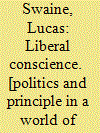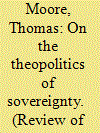|
|
|
Sort Order |
|
|
|
Items / Page
|
|
|
|
|
|
|
| Srl | Item |
| 1 |
ID:
091006


|
|
|
|
|
| Publication |
2009.
|
| Summary/Abstract |
This article describes and explains the relationships between religion and government in contemporary Saudi Arabia. It discusses the extent to which religion is practically involved in politics and governance by examining the mechanisms of domination, the actual relationships between religious scholars ('ulama') and rulers (umara'), and the means by which authority is actually implemented. The current Saudi regime, I would suggest, is best described as a theo-monarchy, that draws power from longstanding religio-cultural norms. In this context, Wahhabi Islam seems to authorize a distinctive government paradigm, one not yet recognized by the relevant Islamic literature
|
|
|
|
|
|
|
|
|
|
|
|
|
|
|
|
| 2 |
ID:
068608


|
|
|
|
|
| Publication |
New York, Columbia University Press, 2006.
|
| Description |
xix, 215p.
|
| Standard Number |
0231136048
|
|
|
|
|
|
|
|
|
|
|
|
Copies: C:1/I:0,R:0,Q:0
Circulation
| Accession# | Call# | Current Location | Status | Policy | Location |
| 051106 | 322/SWA 051106 | Main | On Shelf | General | |
|
|
|
|
| 3 |
ID:
176499


|
|
|
|
|
| Summary/Abstract |
This article considers how we can develop a reflexive reading of the theological contours of global politics through Carl Schmitt's account of sovereignty. In doing this it seeks to generate a critical architecture to understand the pluralistic registers of sovereignty within world politics. This article examines the theological dimensions of sovereignty, calling for a closer reading of the theopolitical discourses of legality and legitimacy at work within the largely secular discipline of International Relations. Tracing the pluralistic dimensions of sovereignty – juristic, popular, and theopolitical – allows us to see how sovereignty is operationalised through a range of distinct political registers. When the study of sovereignty is confused with questions of preference for modes of governing (whether secular, religious, democratic, and/or juristic) the complex historical sociology of sovereignty is overlooked. Contemporary scholarship in International Relations can benefit from closer engagement with the multiple, overlapping registers of sovereignty in global politics. We may disagree with Schmitt's reading of sovereignty as ‘theopolitics’ but there is real methodological value in engaging secular scholarship in thinking about religion as a constitutive domain for global order – alongside a rich range of critical approaches.
|
|
|
|
|
|
|
|
|
|
|
|
|
|
|
|
| 4 |
ID:
096549


|
|
|
|
|
| Publication |
2010.
|
| Summary/Abstract |
According to both contemporary intuitions and scholarly opinion, autonomy is something specifically modern. It is certainly taken to be incompatible with religions like Islam and Judaism, if these are invested with political power. Both religions are seen as centered on a divine Law (sharî 'a, viz., torah) which prescribes what we may and may not do, promising reward for obedience and threatening punishment for disobedience. Not we, but God makes the rules. This picture is in important ways misleading. There is, I argue, a substantive intellectual tradition, going back to Plato's Laws, which takes the purpose of a theocracy-a community governed by God through the intermediary of a divine Law-to be promoting rational autonomy, conceived as (1) the ability to rationally determine what is in one's best interest and (2) having the motivation to live accordingly. Among the most important representatives of this intellectual tradition are medieval Muslim and Jewish philosophers.
|
|
|
|
|
|
|
|
|
|
|
|
|
|
|
|
|
|
|
|
|